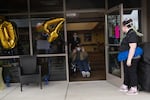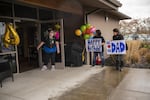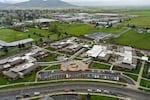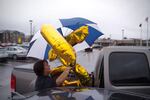Bill Lapschies’ granddaughter Jamie Yutzie said he has a contagious smile tucked behind his pale blue surgical mask.
On Wednesday, Lapschies’ family carried balloons, cake and signs outside the Edward C. Allworth Veterans' Home in Lebanon, Oregon, to celebrate his 104th birthday. With everyone spaced out 6-feet to maintain social distancing, staff wheeled Lapschies out of the home and onto a small patio surrounded by balloons.
Lapschies’ 100th birthday had over 200 people in attendance so Wednesday’s affair was a little small by comparison. But these festivities are special for another reason. With just over 25 days since his first symptoms and 19 days since he had a fever, Lapschies is believed to be the world’s oldest coronavirus survivor.

Bill Lapschies arrives for his 104th birthday party. A World War II veteran, Lapschies is believed to be one of the world's oldest survivors of the coronavirus.
Jonathan Levinson / OPB
Sitting in a wheelchair under an awning as rain came down around him, his legs wrapped in a blanket adorned in American flags and wearing a World War II veteran hat, Yutzie asked Lapschies how he managed to survive his bout of coronavirus.
With a hearty laugh, Lapschies said, “I don’t know.” Pausing for a minute he added, “It just went away. Sit out here and you can get rid of anything.”
Lapschies had a moderate case of the virus, according to his doctor. He never developed severe respiratory issues, Dr. Rob Richardson said, one of the two doctors overseeing care at the veterans home. Richardson said had Lapschies not been in a long term care facility, he likely would have been hospitalized but would not have required a ventilator.
“This could have easily gone another way,” Richardson said. “There's not a lot of interventions that can be done.”
Lapschies was born in Salem, Oregon in 1916 and lived through the 1918 Spanish Flu pandemic that killed between 50 to 100 million people worldwide and endured the Great Depression. In 1939, he married Alamadean “Deanie” Buetell. They were married for 60 years until she died in 2001. In 1943, with two young daughters, he was drafted into the U.S. Army, and for the remainder of WWII he was stationed in the Aleutian Islands where he dispatched trucks and heavy equipment.
His daughter, Carolee Brown, said her father really only ever talked about one part of the war, the end.
“Coming home, being back with his wife and two little girls,” Brown said. “Not so much about what was going on then. Just getting back to life.”
Brown said her father has always had an upbeat personality. To capture his personality, she described how when she was 10 years old and obsessed with horses her father surprised her and took her to a farm with horses for sale.
“We bought a horse; we actually walked it home,” Brown said. “That horse lived with us on a half acre ... until I was like 18 years old. That’s the kind of thing he would do. He was a wonderful family man.”

Granddaughter Jamie Yutzie and daughter Carolee Brown wait for Bill Lapschies, who is 104 and may be the world's oldest coronavirus survivor.
Jonathan Levinson / OPB
Globally, Lapschies has company as a senior survivor of COVID-19. Zhang Guangfen, a 103-year-old grandmother in Wuhan, China, was released from the hospital in early March after recovering. And a 101-year-old Italian man known only as “Mr. P” was recently released from a hospital in Rimini, Italy, after overcoming the illness. Like Lapschies, Mr. P is also a Spanish Flu survivor and WWII veteran.
The odds were stacked against Lapschies. The coronavirus, like the annual flu, has been particularly unforgiving for older patients with underlying health conditions. According to the Centers for Disease Control and Prevention, older Americans account for 80% of coronavirus deaths.
Long term care facilities like the one in Lebanon are uniquely vulnerable to contagious disease, too. They are home to older populations, many with underlying health conditions, living in close quarters and frequently socializing together. With staff and family coming and going, there is an ever present risk of spreading illnesses like the flu or norovirus.

Aerial view of the Edward C. Allworth Veterans’ Home in Lebanon, Oregon, April 1, 2020.
Stephani Gordon / OPB
In late February, after seeing data out of China and watching as the coronavirus ravaged a nursing home in Kirkland, Washington, Dr. Richardson, was bracing for the coronavirus’ arrival at the veterans home.
“I thought we might have a 30% mortality rate here in our facility,” Richardson said in an interview with OPB. “Because all of our veterans have some other medical problems.”
Despite Richardson’s early concerns, the Lebanon home continued to allow some public interaction for its residents.
Richardson said around Feb. 28, he knew it was a matter of when, not if, the coronavirus would arrive at the veterans home. According to Richardson, that prompted the home to start screening visitors and limiting interactions, but those interactions did not stop entirely.
By March 5, he said, Lapschies first became symptomatic and was put into isolation.
The same weekend the Oregon Health Authority confirmed the state’s first coronavirus case in nearby Marion County, the veterans home hosted a number of outside visitors, including a model airplane club meeting and an Alcoholics Anonymous meeting.
Related: 2 New Cases Found At Veterans' Home In Lebanon
By Sunday, March 8, Richardson said it was clear they had a grouping of some sort of respiratory infection in the facility, which he believed was COVID-19. Suspected patients, like Lapschies, began entering isolation. A few days later, on March 11, tests came back that confirmed he and another resident as the facility’s first two coronavirus infections. The other resident, a man in his 90s, has since died.
“It was like, oh crap, it’s here,” Richardson said. “Now, it’s all hands on deck.”
According to the Oregonian/OregonLive, that all hands on deck included two nursing assistants who had been exposed to the virus and were symptomatic. Katrina Vink and Rosemary Hilton developed symptoms after being in direct contact with Lapschies and the other COVID positive patient.
On March 12, the veterans home instructed the two women to get tested, but with tests in short supply, they were turned away because their symptoms were mild. They told the Oregonian they worked for another week before finally being tested. Both came back positive.
Veterans Care Centers of Oregon, the contractor who runs the home for the Oregon Department of Veterans Affairs, declined to comment.

Jamie Yutzie unloads balloons from her car. Yutzie's grandfather, Bill Lapschies, survived the coronavirus to celebrate his 104th birthday.
Jonathan Levinson / OPB
To date, the veterans home has reported 16 total coronavirus cases among its residents. Eight have fully recovered, one hasn’t developed symptoms, two are in serious condition and two have died. The remaining three patients are stable condition. The Oregon Department of Veterans Affairs won’t confirm how many staff have tested positive.
After about ten minutes outside in the cold, now tucked under two blankets, Lapschies’ birthday wound down. His granddaughter, Jamie Yutzie, asked him how it felt to be 104.
“Pretty good,” he said. “I made it.”
